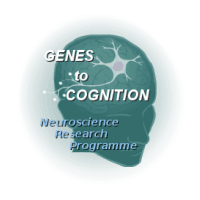An Integrative Neuroscience Program Linking Mouse Genes to Cognition and Disease
Seth G. N. Grant
(Taken from Behavioural Genetics in the Post Genomic Era, Edited by Robert Plomin, John C Defries, Ian W Craig and Peter McGuffin, American Psychological Association 2002. ISBN 1-55798-926-5) PDF version
- Introduction
- General Strategy & Outline
- Connecting the Molecular Mechanisms of Learning
- A Multilayer Organisation
- Layer 1: Identification of Genes Encoding Assemblies
- Layer 2: Genomics
- Layer 3: Functional Genomics - Experimental Neuroscience
- Layer 4: Informatics
- Structural Issues for a Large Multidisciplinary Program
- Conclusions
Conclusions
In the same way that one now understands biochemical pathways underlying various basic biological function including metabolism, cell proliferation and differentiation, the core molecular pathways utilized in neurons for the generation of behaviours will be found. As is already clear, aberrations in these pathways arising from genetic variation will provide a molecular basis for altered behaviour. These molecular insights will provide not only useful diagnostic and therapeutic avenues but also potentially profound insights into human cognition. The development of tools used to link areas of neuroscience through vertical layers ranging from psychology to gene structure will be a valuable resource for new areas of curiosity-led research as well as industrial application.
Perhaps the greatest biological challenge of the 21st century is to understand the mechanisms of human behaviour. This intellectual challenge is of enormous practical significance given the burden of neuropsychiatric disease. Here a general discovery framework for understanding behaviour at the molecular, cellular and systems neuroscience levels in humans is outlined. The key hypothesis driving this program is that molecular assemblies are core components of neurobiology and behaviour and are the fundamental defective unit diseases of the brain. A new approach to human studies of cognition and brain disease can be driven by basic science in model genetic organisms and combined with an integrative program of genome sequencing and neuroscience.
Acknowledgements
I thank the following colleagues and collaborators for stimulating discussions and input: David Bentley, Douglas Blackwood, Robert Plomin, and Jane Rogers.
